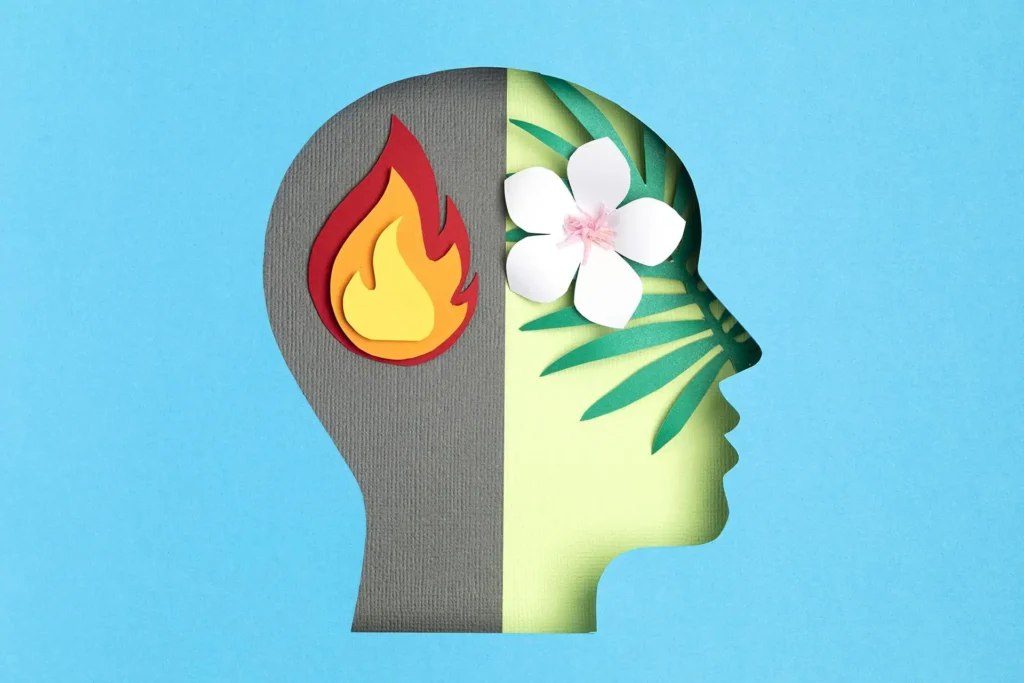
Psychological Disorders & Ayurveda
In Ayurveda, there is extensive information regarding the mind, its diseases, pathology, and treatment. Ayurveda is concerned not only with physical ailments but also with mental health.
Mind and Its Components
According to Ayurveda and Sankhya Darshan, the mind (Mann) is composed of three Gunas: Sattva, Raja, and Tama.
Sattva Guna:
- “Dhrutya yatha Dharayate Manaha Pranendriya kriyah| Yogen Avyabhicharinya Dhrutihi sa Partha SATVIKI ||” (Bhagavad Gita)
- This shloka explains that the intellect (Buddhi) which controls the mind, life, and sensory actions is known as Satviki Buddhi. A person with Satviki Buddhi is firm, calm, and knowledge-loving.
Rajas Guna:
- “Yaya tu dharmakamarthan dhrutya dharyate arjuna | Prasangen Falankanshi dhrutihi sa partha rajasi ||” (Bhagavad Gita)
- This type of Buddhi is focused on Dharma, Artha, and Kama (desires) while also expecting fruitful results. Individuals with Rajasik Buddhi experience alternating periods of happiness and unhappiness.
Tamas Guna:
- “Yaya swapnam bhayam shokam vishadam madam eva cha | Na vimucchati durmedha dhrutihi sa partha Tamasi ||” (Bhagavad Gita)
- Dreaming, fearfulness, lamentation, moroseness, and illusion are traits of Tamasi Buddhi. People with Tamas Guna are often lazy, idle, uneducated, cruel, fickle-minded, and unhappy.
Symptoms and Signs of Mind
- “Dnyansya bhavhaha abhava eva cha” (Presence or absence of knowledge signifies the state of the mind).
Process of Knowledge Acquisition
- “Atamendriya manorthanam sannikarshena dnyanha bhavati”
- The process of knowledge is as follows:
- Bhavpadartha
- Sensory roots (Indriya Artha)
- Sensory organs
- Mann (Mind)
- Atman (Chatuha Vinshati Purush)
The mind receives knowledge and stores it in the Atman, which experiences and reacts according to the Buddhi – Sattva, Raja, and Tama.
Development of Psychological Disorders
- Psychological disorders develop due to imbalances in the mind’s Gunas. The following shlokas from Charak Samhita illustrate this process:Atman Guna (Quality of Atman):
- “Iccha dwesha sukh dukkha prayatna Chetana dhrutihi | Buddhi smruti ahankaro lingani param atmanaha||” (Charak Samhita)
- “Lobha shoka bhaya krodhman vegan vidhrayet | Nairlajyershya atiraganam abhidhyayashch buddhiman ||” (Charak Samhita)
- Extreme desires turn into greed and delusion.
- Extreme hatred leads to sorrow and fear.
- Extreme happiness may lead to fear.
- Extreme unhappiness can turn into sorrow, fear, or anger.
- Excessive effort can lead to greed or sorrow.
Treatment Approach
Ayurveda recommends three primary methods for treating psychological disorders:
- Mantra and Japa:
- Recitation and chanting of mantras to stabilize the mind.
- Medicinal Treatment:
- Procedures like Shirodhara and Nasya are effective.
- Herbs such as Brahmi and Shankhapushpi are beneficial.
- Counseling (Mano-nigraha):
- Guidance and counseling to control the mind’s impulses.
- “Karmanyeva adhikarste ma phaleshu kadachan ||” (Bhagavad Gita)
- Control of Manas Vega:
- It is essential for everyone to control their mental impulses for a better life.
- Yoga:
- Application of Yogic processes to achieve mental balance.
By understanding and applying these principles, one can effectively manage psychological disorders and achieve mental well-being through Ayurveda.

very useful information..